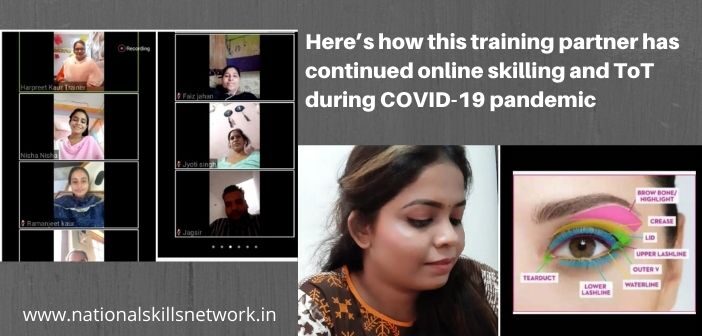
The COVID-19 pandemic and the lockdown has disrupted the norm of a physical, classroom-based method of delivering skills training. However, the crisis also brought an opportunity. Opportunity for the education sector and skill training institutes to shift to online learning and adopt digital technology like never before. We caught up with Ms. Pritha Dutt, Director, Empower Pragati, who, in this Skill Talk will focus on how the shift towards online learning has been, the innovative training initiatives by Empower Pragati, about building the capacity of vocational trainers to do effective online training and much more. Know more from the excerpts from our conversation.
Q: How did you manage the shift to online skills training amidst the lockdown due to the COVID-19 pandemic?
A: We did not initially anticipate that the lockdown would be for so long. Once we realized this and understood the impact it will have on our staff and Trainers and our students, we put in place a strategy. The strategy has a 3-point framework, we call ECR -Engagement, Relevance, and Competence.
Engagement– Engaging students and trainers and keeping them motivated and have a positive frame of mind was important. This required regular connect with them not just on the work front but also in their personal life. We started regular online sessions to share and give them update about the pandemic, about the new initiatives, and to hear their issues. We organized innovative things like e-Chaupal sessions and Talent Festivals with students and trainers across the company. This helped also in maintaining and strengthening rapport Therefore, engaging them was the first point we wanted to address.
Relevance –Since online and digital modes of learning are the option now it is important that our training too becomes relevant to this mode. We already have our learning app called EmpowerPlus and our own LMS. Although the government skill training schemes do not yet consider online training valid we shifted to this mode to provide learning continuity to our students. With skills training shifting online, it is very important for the trainers to stay relevant to changing times. From mid-April, we have been doing short-term training through our learning apps. We also quickly launched online short-term programs in Digital Marketing, Beauty and Makeup, MS Excel, etc. In the beginning, it was difficult as we had to train both the students and the trainers about online tools and how to use them.
Make them competent – We had to ensure that the competencies of the trainers are up to date not just skill-wise but also knowledge-wise. We conducted training sessions for them to learn how to make online training interactive and useful. Trainers were encouraged to attend several courses on Udemy and Coursera too to build their competence.
 Q: What innovative steps and initiatives are taken up by Empower Pragati to ensure trainers are well-trained to take up the online classes?
Q: What innovative steps and initiatives are taken up by Empower Pragati to ensure trainers are well-trained to take up the online classes?
A: Initially, we had to train the trainers about how to maintain discipline during the online classes, and how to make the classes interesting. The content also had to be redesigned in several places. Though it was the first time, it helped us, as we started early. We held several sessions for trainers to quickly get aligned to the new needs. There was excitement on both sides.
To keep the engagement, interest, and learning competencies of the trainers, we appointed observers. Observers make note of points where students were most engaged, what are the issues that the trainer is facing with reference to technology, or the content. This gives the trainers practical insights into what is working while they are taking the sessions.
We also appointed mentors, who would take feedback from the students. Their feedback would also be shared with the trainers. This gives the trainers experiential learning.
The observers are also asked to release a visual training quality heat map. The heat map gives us a sense of how the training is taking place. It is depicted using colors, where red stands for below expectable standards, yellow if it is coming up to the standards, and green if the training is matching up to the standards.
At the end of every class, the observer who is also participating virtually gives the student feedback as well as the observer feedback.
The training team then has one-to-one conversations with the trainers on where to improve and how to improve the delivery of classes, etc. To keep their knowledge level relevant, we also conduct domain tests.
Looking back, some of the key areas we focused on were: pedagogy through the technology change, observer giving the feedback, training manager making one-to-one calls, conducting periodic domain tests to ensure their knowledge is up to date.
Q: Did you also train your trainers on how to take the assessments online?
A: As of now only internal assessments are being taken. In Empower Pragati, internal assessments have always been online. So, it wasn’t much of a challenge. Questions are decided by the head office, which is made into different sets.
In June, we got our own LMS. Therefore, now we have greater control over the batch, group conversations can be made, content can be shared on this platform that does not vanish upon deleting.
Related Article: Success Stories of trainees from Empower Pragati – Read More: https://nationalskillsnetwork.in/empower-pragati-2/
Q: What should be the new approach of vocational trainers to teach the students?
A: Technology adoption has been absolutely fabulous. The way the skills and education sector adopted these changes has been overwhelming. It was a bulldozer approach as there was no choice. People realized that is not so difficult. One can do meetings and one can also train completely online. There was a mindset issue in adopting technology. That must stay and will stay.
However, for vocational skill training, we do need some hands-on session OJT’s, and practical lab-based learning. And trainers have to become competent to handle blended learning. Content too needs to reimagined. The content cannot be text-heavy or only available as a document. It has to be digitized, byte-sized, engaging, and yet relevant to the QP-NOS. These new requirements have to be included in the role of a trainer and integrated into the entire skilling ecosystem. The assessment has to be much more continuous. The process of both formative and summation has to be followed. NEP 2020 (National Education Policy) has spoken a lot about creative and out-of-the-box thinking. NEP 2020 will also help vocational training and skilling to become mainstream as part of education.
Q: What are the skills required by trainers apart from the domain knowledge?
A: Apart from the domain knowledge, trainers are required to have a number of skills. We have developed our own mentoring program called Saarthi. It is developed in collaboration with the British Council. The role of a trainer is both of a mentor and a counselor for students. For this, the trainers would need interpersonal skills, rapport building, compassion, conflict handling apart from pedagogy skills, presentation, and mentoring.













Nice